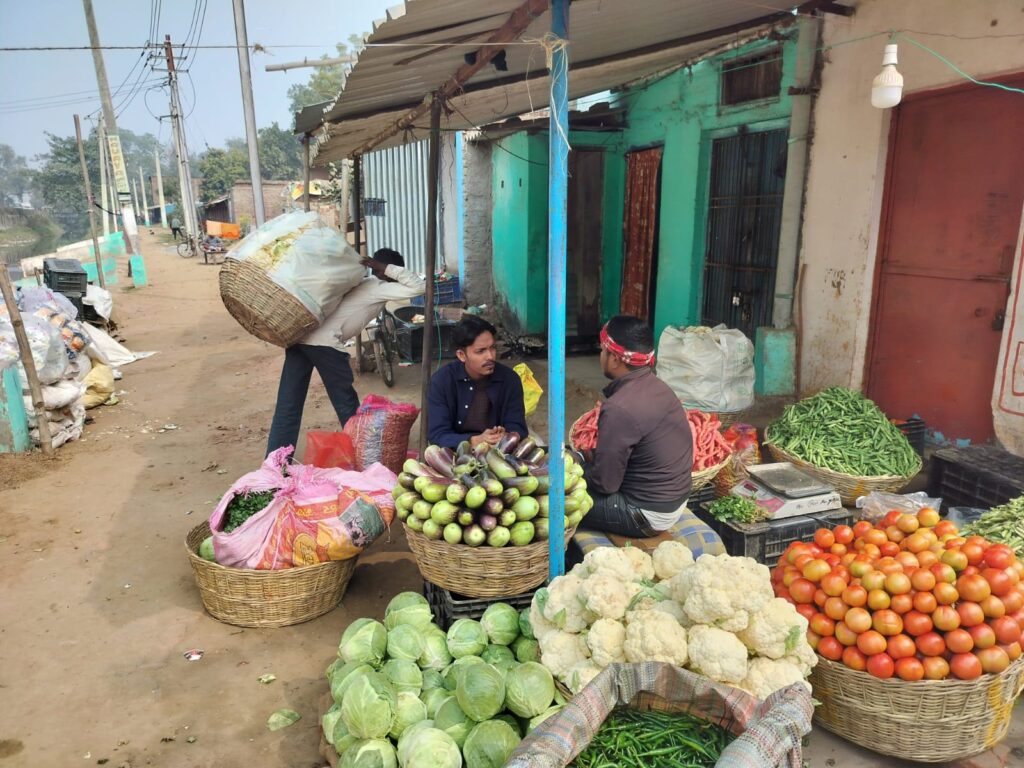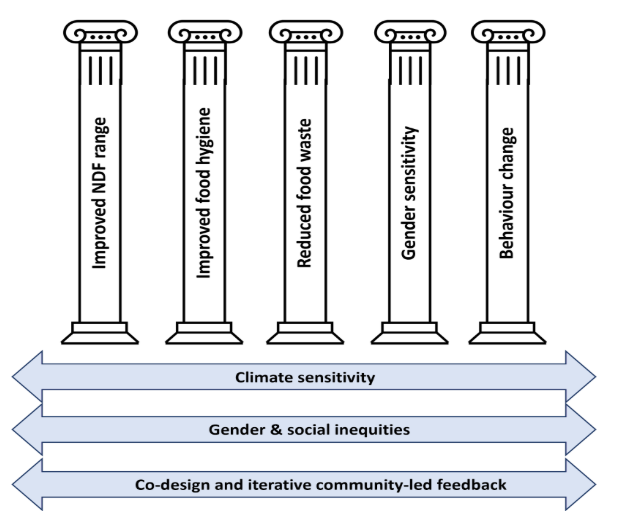INFUSION’s research activities take the form of a three-pillar approach.
Workstream One is foundational, collecting and analysing detailed data on rural food markets, how people interact with food markets and the implications for their nutrition.
Workstream Two co-designs, implements and evaluates market-focused interventions to improve access to nutrient dense foods.
Workstream Three is responsive to the research needs of policymakers.
Three overarching themes cut-across each workstream:
- Climate-sensitivity
- Gender and social equity
- Co-design
Workstream One
Workstream one is home to a series of foundational research activities which together help to better understand the functioning of rural markets in Bihar, as well as their contribution to the diets of local households and communities. At present, researchers across INFUSION are involved in three major data collection activities as part of Workstream one:
High frequency market data collection
Rural markets in Bihar exist within an extremely poor information environment, with very little known about their operations, the infrastructures available to market participants, and the modes of governance responsible for the day-to-day running of the markets. In partnership with the data collection agency DAI Research & Advisory Services, we have mapped approximately 300 rural haats across both Bhojpur and Samastipur districts of Bihar, helping us to create a typology of rural markets with respect to the number of vendors present, the types of NDFs available, and the presence of various built infrastructures and services. In addition, from each of these ~300 markets, we are collecting price information for approximately 20 different nutrient-dense foods up to twice per week – enabling the analysis of how prices transmit across space and time, and potentially influence the availability and affordability of NDFs in different locations.
Seasonal mixed-methods market data collection
To complement the high frequency data collection, we are conducting a series of qualitative and quantitative data collections in a subset (n = 50) of our high frequency markets. Here we aim to better understand the seasonal dynamics of the markets, including the availability of key nutrient-dense foods, their in-market wastage rates, and associated food handling and safety practices. These quantitative surveys are then supported by a series of qualitative interviews with vendors, consumers and market experts (i.e., market managers) to help explain the quantitative patterns observed, such as the motivations and reasons behind the occurrence of food waste, use of different infrastructures (e.g. sheds and other storage facilities), and the experience of women within the local environment (e.g. physical safety).
Household dietary data collection
Led by the team at the London School of Hygiene and Tropical Medicine and in partnership with the data collection agency DCOR, we are also conducting a dietary survey across a total of 1200 households in Bhojpur and Samastipur districts of Bihar. These surveys aim to understand the contribution of NDFs to the diets of rural communities (and different stratas of society, e.g., women and marginalised castes), as well as the role in which local markets play in the supply of these foods. In line with the mixed-methods market data collection outlined above, the household surveys are conducted once per agro-climatic season, i.e., once each during the monsoon (June – September), winter (October – March), and summer seasons (April – May).

Workstream Two
Market-based interventions
Workstream two is responsible for the development, implementation and evaluation of market-based interventions to increase the availability and affordability of nutrient-dense foods (e.g., fruits, vegetables and animal-source foods) in rural Bihar.
Since mid-2023, the INFUSION team has been working alongside the Bihar Rural Livelihoods Promotion Society (“JEEViKA”) to co-design new markets for fruits, vegetables and animal-sourced foods. Termed Didi Haats (didi means ‘elder sisters’ in Hindi), the initiative aims to develop and test the feasibility of ‘model rural markets’ across Bihar – prioritising the creation of safe, hygienic and inclusive environments for local buyers and sellers of nutrient-dense foods (NDFs, i.e., fruits, vegetables and animal-source foods). The Didi Haat scheme builds upon the successes of JEEViKA’s ‘Didi Ki Rasoi’ and ‘apna JEEViKA haat’ schemes, with the latter piloted in 2018 but discontinued during the COVID-19 pandemic. Central to the aims of Didi Haat are the five core pillars depicted below, which every Didi Haat should prioritise:

To date, the co-design activities in collaboration with JEEViKA colleagues have involved multiple in-person workshops, meetings with the JEEViKA CEO and a fully developed proposal document developed in late-2023. The Didi Haat concept has been further refined through INFUSION’s formative research in Samastipur and Bhojpur districts, insights gained from the academic and grey literature, and consultations with design professionals. Once opened, the INFUSION research team will conduct a process evaluation to track the operations and efficacy of the haat, including the volumes of NDFs traded, the quantities of food loss generated, key food safety and hygiene indicators, and the experiences of local female vendors and haat customers. As of early-2025, the first haat in Nalanda district is set to open in the spring of this year, with the process evaluation running for up to 12 months after opening.
In addition to the Didi Haats initiative, there are plans to conduct a second intervention alongside JEEViKA in Bihar – focused around strategies of NDF demand creation in rural households. Discussions are currently ongoing as to the exact nature of this intervention, so please check point soon for a more detailed update!
Workstream Three
Policy responsive research
Workstream three is designed as the ‘policy responsive’ workstream – providing space for short-term research to provide rapid insights and responses to government questions. Whilst the majority of research to date has been focused on Workstreams 1 and 2, one key activity has been the contribution of text to the subchapter on ‘Development of Rural Haats’ in the Fourth Agriculture Roadmap of the Government of Bihar (2023-2028) – an official policy document detailing the government’s vision for the next five years. The document commits to develop “[raised] platforms, covered sheds, storage facilities, drinking water and sanitation facilities…” (p.47), with the Government of Bihar reserving INR 30 crore (~£2,838,659) to upgrade over 1500 rural markets across the next five years.
Initial discussions are currently ongoing with both the governments of Odisha and Bihar with regards to further responsive research, particularly related to the development of value chains for ‘forgotten foods’ and the monitoring and evaluation of existing nutrition-related programmes. Please do watch this space for further updates in the near future!
Cross Cutting Themes
Three priority themes cut across our workstreams to inform all of INFUSION’s agenda and activities
- Climate sensitivity: Mutli-decadal climate change and sporadic extreme weather-related events (e.g., floods and droughts) present existential threats to food systems both in India and around the world. Mainstreaming climate aspects, both mitigation as well as adaptation, into our portfolio of work involves, for example, explicitly accounting for seasonality in our typologies of markets and associated barriers faced by rural consumers, exploring the sensitivity and resilience of local food environments to different climate conditions , and explicitly considering the actions, infrastructures and investments required to create rural markets that are also climate resilient.
- Sensitivity to gender and wider social inequities: Multiple dimensions of equity are fundamental to the Indian context, including along gender-based, income-based and caste-based lines. We adopt mixed-methods approaches to identify the constraints that prevent women from participating in markets (such as lack of safety, agency, time, and restrictive gender norms), as well as the inequalities women face for those who do participate (such as gender differentials in prices, access to technology and information, and market governance). In turn, the Healthy Haats intervention mainstreams ideas of safe market spaces for women, and promotes their participation both as sellers and buyers of NDFs and other food and non-food items.
- Co-design: We believe that research results are translated into policy action when three conditions are met: (i) the process must be intentional and legitimate, with early involvement of key stakeholders, (ii) the data and research design must be credible and robust, and (iii) the questions must be salient to both the short-term and long-term horizons of policymakers. Following these principles, INFUSION research aims to be embed co-design principles wherever feasible, including with local stakeholder communities (e.g. local vendors of fruits and vegetables living around the potential Didi Haat site) and decision makers at different scales (e.g. both Block-level and State-level project managers at JEEViKA).